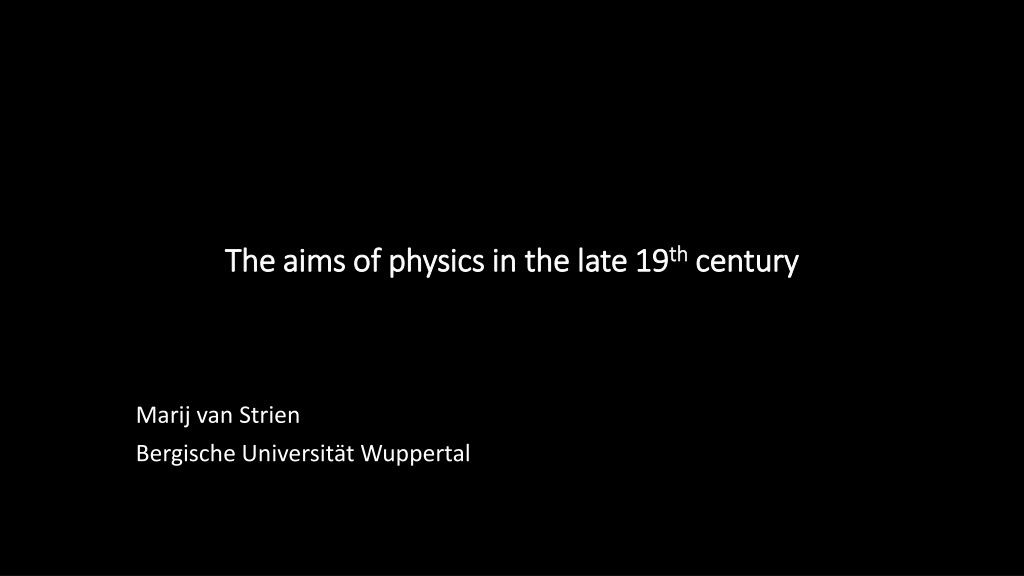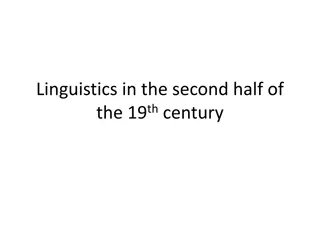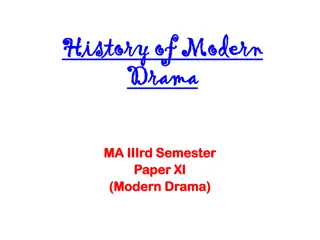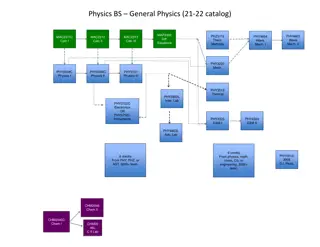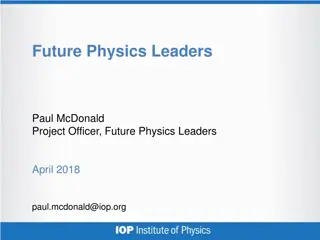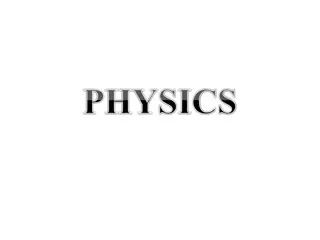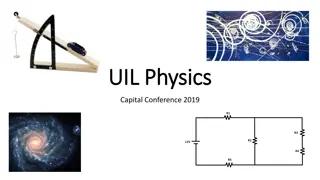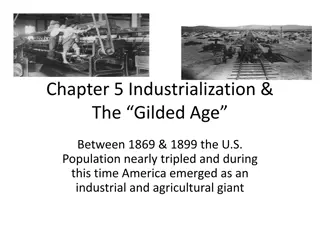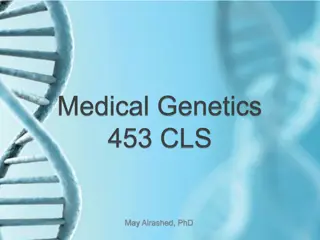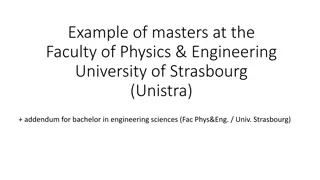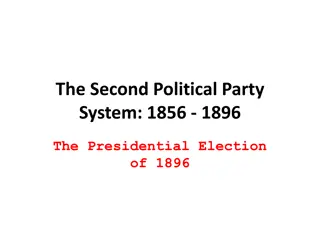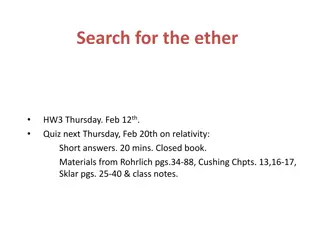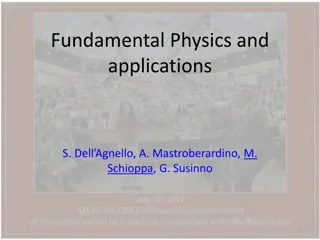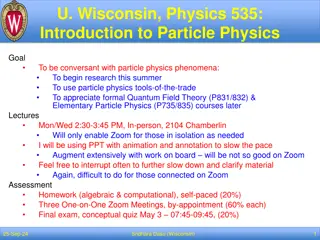Evolution of Physics Goals in the Late 19th Century
Physicists in the late 19th century shifted towards modesty regarding the aims of physics, moving away from ontology and truth claims. The ideal of reduction to matter and motion was criticized, and determinism was seen as a regulative principle rather than a proven feature. The concept of descriptionism emerged as a defensive rhetoric recommending withdrawal from big questions and a relaxation of truth claims. This change in ultimate aims and explanatory ideals influenced the practice of physics in theory choice, research programs, and methods.
Download Presentation

Please find below an Image/Link to download the presentation.
The content on the website is provided AS IS for your information and personal use only. It may not be sold, licensed, or shared on other websites without obtaining consent from the author. Download presentation by click this link. If you encounter any issues during the download, it is possible that the publisher has removed the file from their server.
E N D
Presentation Transcript
The aims of physics in the late 19 The aims of physics in the late 19th thcentury century Marij van Strien Bergische Universit t Wuppertal
What is the ultimate aim of physics? What would an ideal theory look like? Reduction to matter & motion Determinism Laplacian ideal: In how far did this ideal hold up during the 19thcentury?
During the late 19th century, there was a move away from ontology and truth claims in physics; physicists became very modest about the aims of physics. - Theories and laws in physics do not give a direct representation of nature - Reduction to matter and motion was criticized (Mach, Poincar , Duhem) - Even if you give a description in terms of matter and motion, it should be seen merely as a model and not a true representation of nature (Maxwell, Boltzmann) - Determinism as regulative principle rather than as established feature of physics
Heilbron (in Fin-de-Sicle Physics, 1982) introduces the term descriptionism : It signifies the least common denominator among conventionalism, instrumentalism, nominalism, etc.; and tolerance, even encouragement, of diverse, partial or complementary approaches to physical theory. Descriptionism recommends withdrawal from big questions and relaxation of claims to knowledge of truths. Main cause: cultural climate. Descriptionism was a defensive rhetoric, and not much more, according to Heilbron: Only when preparing public lectures can most physicists afford to be epistemologists.
Is the rhetoric of descriptionism in late 19th century physics indeed irrelevant for scientific practice? It signifies a change in ultimate aims and explanatory ideals in physics. These aims and ideals may never be fully realized in practice, but nevertheless set the program for physics. Ways in which descriptionist philosophies of physics shape practice: - Theory choice, choice of research program - Methods
In this talk, I will: - Discuss what the aims and explanatory ideals are in physics, according to a number of scientists of the second half of the 19th century - Note a general trend towards descriptionism , even if there were otherwise large individual differences. - See how these views mattered for doing physics - Correct the image we have of classical physics
The Laplacian ideal: Du Bois-Reymond Knowledge of nature more precisely, scientific knowledge, or knowledge of the physical world with the aid of and in the sense of theoretical natural science means the reduction of all change in the physical world to movements of atoms, which are set into motion by central forces which are independent of time, or the resolution of natural processes into the mechanics of atoms. It is a fact of psychological experience that, where such a resolution succeeds, our desire of tracing things back to their causes (Kausalit tsbed rfnis) is provisionally satisfied. (Du Bois-Reymond, 1872) Note: this is a definition of scientific knowledge. It sets the boundaries of science.
Outside the boundaries of science: consciousness, the nature of matter Within the boundaries of science: if we know all positions and motions of atoms, we can know the entire past and future of the universe and everything that happens in it. ...a mind which should know for a given very small period of time the position and movement of all the atoms in the universe, would also necessarily be in a position to derive from these, in accordance with the laws of mechanics, the whole past and future. (Du Bois-Reymond, 1872).
How this sets the program for science: - Reduction of physics to motion of atoms - Reduction of other domains (notably physiology) to physics.
Helmholtz: On the Aim and Progress of Physical Science, 1869: Our desire to comprehend natural phenomena, in other words, to ascertain their laws, thus takes another form of expression that is, we have to seek out the forces which are the causes of the phenomena. all changes in the world are changes in the local distribution of elementary matter, and are eventually brought about through Motion. the ultimate aim of physical science must be to determine the movements which are the real causes of all other phenomena and discover the motive powers on which they depend; in other words, to merge itself into mechanics.
Note on mechanical reduction: - Reduction of entities and processes to matter, motion, and (central) forces. Often, but not always, atomistic. - OR: Showing the mechanism behind the phenomena: springs, wheels, pulleys, etc.
Maxwell: Mechanical models and analogies Understanding through mechanical models and analogies. Maxwell uses mechanical models freely, switches between different models and is not too concerned about inconsistencies between them. No demand that models give a true representation of nature. Analogies enable us to work with a clear physical conception without being committed to specific physical hypotheses. E.g.: analogy between electrostatics and fluid motion. The substance here treated is not even a hypothetical fluid which is introduced to explain actual phenomena. It is merely a collection of imaginary properties which may be employed for establisheing certain theorems in pure mathematics in a way more intelligible to many minds and more applicable to physical problems than that in which algebraic symbols alone are used.
Mechanical models in practice: Kinetic theory of gases Models of the aether
Mach Economic function of science: summary of experience. Sensations are central; the task of physics is to find functional dependencies between phenomena. To find such dependencies, we always have to start from our own interests, and use abstractions.
No need to look for causes: The notion of cause is problematic because there is never exact repetition in nature, it is only by means of abstraction that we can say that A is always followed by B. Cause is a primitive notion; the notion of function enables a more precise and quantitative account of phenomena There are philosophical puzzles connected to the notion of cause that can simply be avoided by not using causal concepts, e.g. whether causes precede their effect or are simultaneous with them.
No atoms: too speculative. Opposition to mechanical reduction. If we believe at present that mechanical facts are more intelligible than others, and that they can provide the foundation for other physical facts, then this is a deception. It arises from the fact that the history of mechanics is older and richer than that of physics, so that we have been familiar with mechanical facts for a longer time. Who can claim that electrical and thermal phenomena will not at some point appear similarly to us, when we have come to know their simplest rules and have become familiar with them? (Mach, 1872)
Poincar The aim of science is not things in themselves, as the dogmatists in their simplicity imagine, but the relations between things; outside those relations there is no reality knowable. (Poincar , 1902) Laws of nature are classifications of antecedents and consequents, and always approximate and incomplete. ...no particular law will ever be more than approximate and probable. Scientists have never failed to recognize this truth; only they believe, right or wrong, that every law may be replaced by another closer and more probable, that this new law will itself be only provisional, but that the same movement can continue indefinitely, so that science in progressing will possess laws more and more probable, that the approximation will end by differing as little as you choose from exactitude and the probability from certitude. (Poincar , 1905)
Poincar is critical about mechanical reduction. Point particle mechanics does not suffice. Rather than finding underlying mechanisms, work with general principles: conservation of mass and energy, equality of action and reaction, principle of least action.
Anti-mechanism in the late nineteenth century Physicists including Mach, Poincar and Duhem felt that mechanical models were often too speculative, to complex, and not fruitful enough. Rather than developing such models, physicists should restrict themselves to classifying and describing phenomena. Specifically, they objected to atomism, and to the kinetic theory of gases, which aimed to reduce thermodynamics to mechanics. Thermodynamics should stand on its own.
Boltzmann Boltzmann continued Maxwell s program of mechanical models; he presented himself as a reactionary in doing so. But we don t need a true description of natural processes, but rather a picture . it cannot be our task to find an absolutely correct theory but rather a picture that is as simple as possible and represents the phenomena as accurately as possible .
Boltzmann Laws of nature do not hold exactly and absolutely, physics only offers idealized models. Laws of nature can be statistical; fundamental role of probabilities in statistical mechanics
Determinism in late-19th-century physics Laplace s determinism: given the position and velocity of all particles at an instant, plus the laws of nature, the entire future and past of the universe can be calculated. But: the idea that all natural processes can be reduced to motion of atoms, and that there is a fixed set of exact laws of nature determining this motion, would have seemed overly simplistic by the late 19th century.
Mach: Laplacian determinism is part of a mechanische Mythologie and an overestimation of the scope of physics. - There is no notion of time for the universe as a whole - As laws of nature are summaries of experience: they cannot be extrapolated too far beyond experience, and never give a complete and fully accurate description of nature
Mach, 1905: The correctness of the position of determinism or indeterminism cannot be proven. It can only be decided if science is completed or demonstrably impossible. It is a matter of suppositions which we bring to the contemplation of things, depending on whether one attaches a greater subjective value to the successes or to the failures that research has attained so far. But during research, every thinker is necessarily a theoretical determinist. (...) However, the researcher must always be prepared for disappointment. [experience is limited, there can always be factors one has not taken account of, there is never exact repetition in nature]. Thus, also he who advocates an extreme determinism in theory must in practice remain indeterminist, in particular when he does not want to speculate away the most important discoveries.
Boltzmann, 1899: Precondition of all scientific knowledge is the principle of unique determinacy of natural processes; in the case of mechanics, the unique determinacy of all motions. This means that the motions of bodies do not purely by chance take place now in this way and now in that, but that the motions are uniquely determined by the circumstances in which the body finds itself. If each body would move around however it wanted, if under equal circumstances now this, now that motion would follow purely by chance, we could only curiously observe the course of the phenomena, but not examine them.
Boltzmann describes our tendency to look for causes as a habit of thought, an evolutionary a priori. It is usually effective in helping us make sense of the world, but can overshoot the mark. Similarly, a principle of unique, local determination of motion helps us to make sense of the world, although there is no a priori guarantee that it always holds (and it cannot be derived from experience either).
Poincar, 1913: Science is deterministic; it is deterministic a priori; it postulates determinism, because without it, science could not exist. It is also deterministic a posteriori; if it started out by postulating determinism, as a necessary condition for its existence, it then demonstrates determinism precisely by existence, and each of its conquests is a victory of determinism. (Poincar , 1913) ...science, rightly or wrongly, is deterministic; wherever it enters, it brings determinism. (Poincar , 1913)
Determinism as a regulative principle: - Not an established feature of our theories, but rather a regulative principle which makes science possible or makes scientific problems more tractable - Agnosticism about the ontological level.
Revising our image of classical physics? Classical physics: Euclidean space and time Determinism Unity Confidence: the basics have been figured out
Conclusions Descriptionism is a broad trend, across philosophical dividing lines. Theories don t have to offer true representations of nature Laws of nature as mere approximations (possibly statistical) Mechanical reductionism under discussion Determinism as regulative principle, rather than as established feature of physics
The fact that laws of nature are always approximations means that not all features of mathematical models may be physically relevant. Poincar (1891): One of the questions with which researchers have been most preoccupied is that of the stability of the solar system. This is, if truth be told, more a mathematical question than a physical one. Even if one were to discover a general and rigorous proof, one could not conclude that the solar system is eternal. It may, in fact, be subject to forces other than those of Newton. Ways in which our descriptions of the solar system may not be 100% accurate: - Planets are not point masses - There may be other forces than gravity - There is dissipation of energy
Maxwell also uses mechanical analogies for the issue of determinism and free will: like a machine can be set in motion through a small human act, so the human body may be set in motion through a small (possibly infinitesimal) intervention of the mind. the doctrine of the conservation of energy, when applied to living beings, leads to the conclusion that the soul of an animal is not, like the mainspring of a watch, the motive power of the body, but that its function is rather that of a steersman of a vessel not to produce, but to regulate and direct the animal powers. (Maxwell, 1873).
...no particular law will ever be more than approximate and probable. Scientists have never failed to recognize this truth; only they believe, right or wrong, that every law may be replaced by another closer and more probable, that this new law will itself be only provisional, but that the same movement can continue indefinitely, so that science in progressing will possess laws more and more probable, that the approximation will end by differing as little as you choose from exactitude and the probability from certitude. (Poincar , 1905) Generally, in order to do physics, we have to make assumptions, which can neither be proven empirically nor established a priori: Relations between physical quantities can be expressed through continuous functions Only the direct environment of phenomena has an effect
